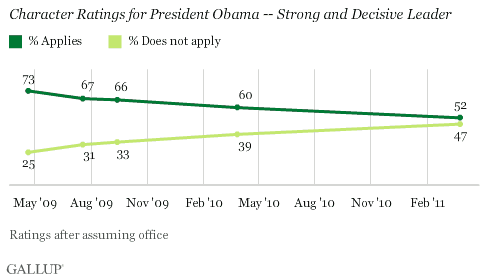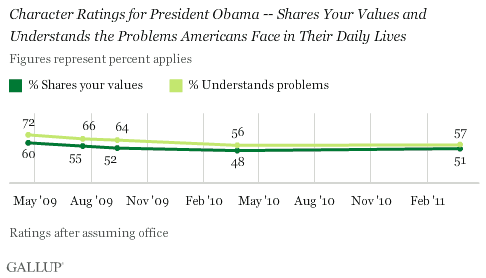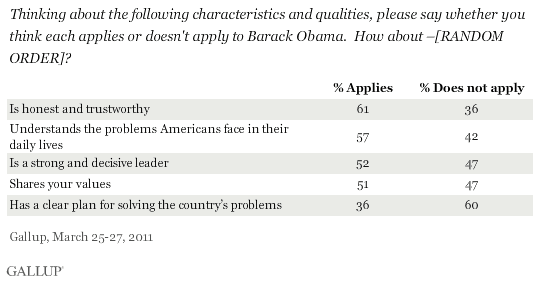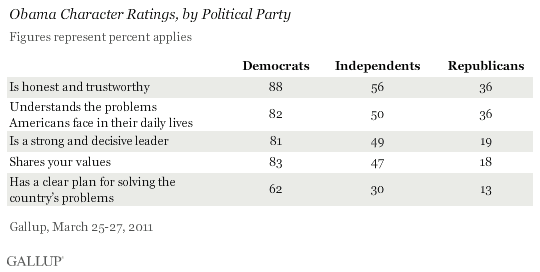PRINCETON, NJ -- Americans have grown increasingly less likely to view President Obama as a strong and decisive leader since he took office. Roughly half now believe this aptly describes him, compared with 60% a year ago and 73% in April 2009.

These results are based on a March 25-27 Gallup poll, conducted just before Obama's widely covered speech on U.S. military action in Libya on Monday night.
The decline in Obama's leadership rating stands in contrast to the stability in the trend for two other personal dimensions. Fifty-seven percent of Americans believe the president understand the problems Americans face in their daily lives, essentially unchanged from 56% in March 2010. And 51% of respondents believe Obama shares their values, similar to 48% last year. Both ratings are down from early 2009.

Altogether, Obama's ratings on being a strong and decisive leader are down a total of 21 percentage points since taking office, compared with a 15-point decline on understanding Americans' daily problems and a 9-point decline in sharing their values. Obama's overall job approval rating declined 16 points over the same time period.
The March 25-27 poll also asked Americans to rate Obama on two other dimensions not yet tested since he took office. Sixty-one percent believe Obama is honest and trustworthy, while 36% say he has a clear plan for solving the country's problems -- marking the high and low scores of the five characteristics tested in the poll.

During the 2008 presidential campaign, honesty was a relatively strong suit for him and having a clear plan was a weaker area.
Obama Leadership Ratings Down Among All Party Groups
All party groups are less likely to consider Obama a strong leader than they were a year ago. Now, under half of independents (49%) believe Obama is a strong and decisive leader, compared with 56% in 2010. The vast majority of Democrats continue to believe he is a strong leader, but that, too, is down from 89% to 81%. Republicans' views of Obama's leadership, the least positive of the three groups, are down the most since last year (32% to 19%).
Honesty is Obama's strongest attribute among all party groups in the current survey, and the only trait ascribed to Obama by a majority of independents. Majorities of Democrats attribute each of the four other positive characteristics to Obama, but they are notably less likely to believe Obama has a clear plan for solving the country's problems.

Implications
Throughout this year in office, President Obama's ratings on several dimensions, including job approval and most personal characteristics, trended downward, but have since more or less stabilized. One notable exception to that general pattern is perception of the president as a strong and decisive leader, which has continued to drop, and now only a slim majority of Americans rate him positively in this regard.
Given the timing of the two most recent ratings on Obama as a strong and decisive leader (March 2010 and 2011), it is not clear how much the recent events in the Middle East have contributed to this perception. Obama's overall job approval rating in Gallup Daily tracking has fluctuated since mid-March, roughly coinciding with the military campaign in Libya. For the week of March 21-27, though, Obama averaged 45% approval and 47% disapproval, his worst since December.
Moreover, Obama's ratings for handling the situations in Libya and Egypt have not been stellar but also not poor. In any case, much of the 2011 news coverage has focused on major international events and President Obama's response to these events has been a key element of that coverage.
Explore President Obama's approval ratings in depth and compare them with those of past presidents in the Gallup Presidential Job Approval Center.
Survey Methods
Results for this Gallup poll are based on telephone interviews conducted March 25-27, 2011, with a random sample of 1,027 adults, aged 18 and older, living in the continental U.S., selected using random-digit-dial sampling.
For results based on the total sample of national adults, one can say with 95% confidence that the maximum margin of sampling error is ±4 percentage points.
Interviews are conducted with respondents on landline telephones (for respondents with a landline telephone) and cellular phones (for respondents who are cell phone-only). Each sample includes a minimum quota of 150 cell phone-only respondents and 850 landline respondents, with additional minimum quotas among landline respondents for gender within region. Landline respondents are chosen at random within each household on the basis of which member had the most recent birthday.
Samples are weighted by gender, age, race, education, region, and phone lines. Demographic weighting targets are based on the March 2010 Current Population Survey figures for the aged 18 and older non-institutionalized population living in continental U.S. telephone households. All reported margins of sampling error include the computed design effects for weighting and sample design.
In addition to sampling error, question wording and practical difficulties in conducting surveys can introduce error or bias into the findings of public opinion polls.
View methodology, full question results, and trend data.
For more details on Gallup's polling methodology, visit https://www.gallup.com/.
